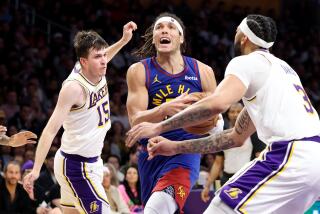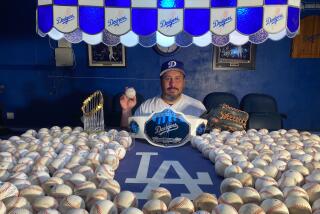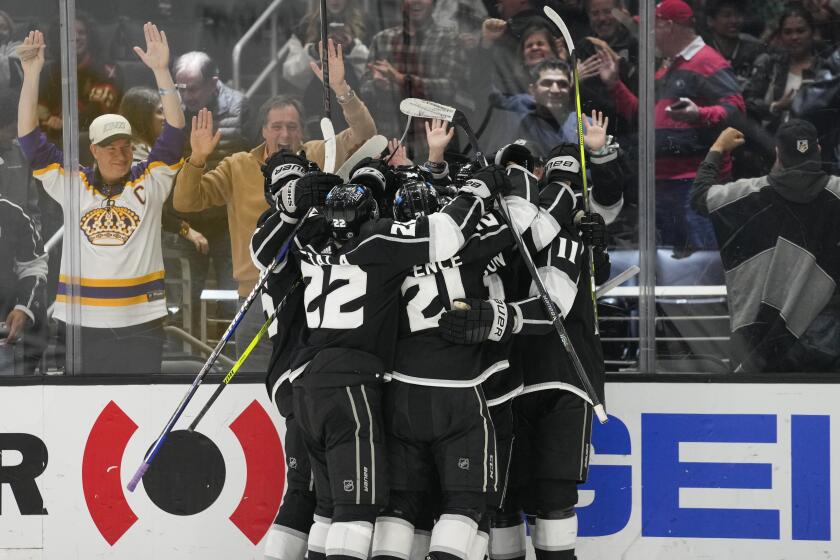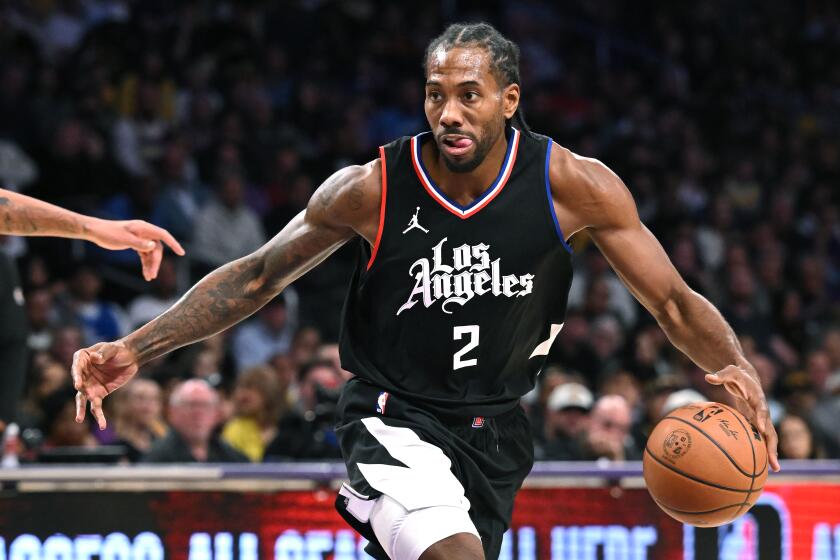L.A. Marathon is subject of rumors
As the 23rd running of the Los Angeles Marathon approaches, the race remains something of a mixed bag.
It is popular with Southern Californians but is ignored by many top marathoners who prefer events in London, New York and Boston, and viewed with suspicion by sports agents who have had trouble collecting appearance fees from current race operator Chris Devine.
Now the marathon that founder William Burke sold to Devine four years ago for $15 million reportedly is on the block again. A national sports business publication reported last month that Chicago-based Devine Racing is in talks with a private equity firm that recently acquired four cycling, marathon and triathlon businesses and is on the prowl for more race-related companies.
David Moross, chairman of Falconhead Capital LLC, a New York investment firm, declined to comment on the reported discussions with Devine -- but did state that more deals will occur: “All I can tell you is to stay tuned.”
Devine wrote in an e-mail to The Times that he was “horribly misquoted” by the Sports Business Journal, and that there is no deal to report, though he did not address whether he was in discussions with Falconhead. The publication did not respond to a request for comment.
Whether the race is for sale, the rumors suggest that the once sleepy business of running marathons -- long the province of mom-and-pop operators who scramble to stage one race per year -- might finally be poised for change.
“We absolutely think there’s a need -- a crying need -- for consolidation on multiple fronts,” said Moross, whose company acquired three endurance sports companies in San Diego County on Jan. 7. “There are a lot of revenue synergies and cost synergies, and, ultimately, we could give [runners] a much better product.”
For runners, that could mean easier registration, better-marked courses, plenty of water stations and, for elite competitors, better paydays. For municipalities, it could bring a stronger economic boon should the new-and-improved events attract additional out-of-town runners.
Though the Los Angeles race draws as many as 25,000 runners, last year 95% were from California. In contrast, just 20% of the 23,906 athletes in last year’s Boston Marathon were from Massachusetts, and 14% were from other countries. About half of the ING New York City Marathon field came from other countries.
Falconhead will have to prove that it can wring additional revenue and profits from its newly acquired race-related businesses. The allure for Moross is the attractive demographics of such endurance sports as marathons, triathlons and long-distance cycling. For example, Triathlete magazine’s 60,000 subscribers boast a median income of $122,600.
Falconhead believes it now can offer easier access for car companies, fast-food chains and other marketers to almost 200,000 athletes who will register for races this year.
“It’s a good time to be selling sponsorship to marathons and other running-related events,” said William Chipps, senior editor of Chicago-based IEG Sponsorship Report, which estimates that sponsorship spending for the category during 2007 rose by 14% to $77.5 million.
Falconhead isn’t the first company to pursue a consolidation. Devine tried to do much the same thing after acquiring the L.A. Marathon in 2004, when he assembled a high-powered team of sports marketing executives and sought out acquisitions.
But the process proved more difficult than anticipated, Devine has said, because many races were not sufficiently profitable or had “suspect” bookkeeping. His Chicago-based Devine Racing, which had staffed up to market corporate sponsorship deals, ran into cash-flow problems that led to delayed payments to professional athletes who had run in Devine races.
Devine, in a 2006 interview with The Times, described the cash crunch as temporary. But well into 2007 some athlete agents publicly complained about continued late payments. In a recent e-mail, Devine said that all runners in the 2007 L.A. Marathon have been paid, and that winners of December’s Las Vegas Marathon will be paid before March 1.
The international reputation of the L.A. Marathon, which will run its 23rd annual race March 2, continues to suffer, according to marathon industry observers.
“Obviously, L.A. has taken a hit on the quality of the field,” said agent Derek Froude, who represents such athletes as Marilson Gomes Dos Santos, who won the 2006 New York City Marathon. “I’m working with them the best I can, but there definitely are managers [who] won’t deal with Devine at present, and that’s hurting the overall sport.”
Ricky Simms, director of Teddington, England-based Pace Sports Management, which represents such runners as Stephen Ndungu of Kenya, who won the Los Angeles race in 2001 and 2002, also said that the cash crunch continues to worry some agents. “To be honest, none of our athletes have asked to run in the L.A. Marathon recently so it has not been a problem,” Simms said. “But it is something that we keep an eye on.”
Prize money also shapes a race’s image among top runners. The L.A. Marathon offers $100,000 to the first runner to finish. He or she -- a time differential is established once the top male and female field is set -- also receives a $20,000 prize and a Honda Accord.
The appearance of top athletes tends to have a synergistic effect, according to Jeff Vannini, co-owner of Phidippides Encino, one of Southern California’s premier running stores. Though he has run dozens of marathons, he still gets a kick out of competing against the world’s best athletes. “That doesn’t happen in NASCAR, football or baseball,” Vannini said.
Vannini also longs for a course that would incorporate a brief stretch along the Pacific Ocean. “What could be more attractive than running in Los Angeles at that time of the year?” Vannini said. “Who wouldn’t want to run a race that shows everything that L.A. is about?”
--
More to Read
Get our high school sports newsletter
Prep Rally is devoted to the SoCal high school sports experience, bringing you scores, stories and a behind-the-scenes look at what makes prep sports so popular.
You may occasionally receive promotional content from the Los Angeles Times.






